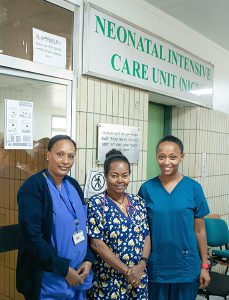
Two hospitals in Addis Ababa, Ethiopia, are demonstrating that even when entry to assets is proscribed, dedication to an infection prevention and management (IPC) practices makes combating antimicrobial resistance (AR) attainable.
Antimicrobial-resistant micro organism could cause extreme, hard-to-treat infections. They have been related to nearly 5 million deaths worldwide in 2019. IPC practices corresponding to correct hand hygiene, right use of private protecting gear (PPE), and ample cleansing and disinfection of the healthcare setting, are essential to stop the unfold of antimicrobial-resistant threats inside healthcare settings. Nevertheless, healthcare services with restricted assets could lack the instruments or coaching mandatory to hold out these practices.
Ethiopia is the primary nation in Africa to hitch CDC’s World Motion in Healthcare Community (GAIHN). Enhancing and sustaining IPC practices is vital to GAIHN’s mission of defending sufferers and healthcare employees from antimicrobial resistance threats. By GAIHN, two hospitals in Addis Ababa are collaborating with CDC, the Ethiopian Public Well being Institute, and The Ohio State College to scale back the unfold of antimicrobial-resistant micro organism of their services.
Throughout an preliminary analysis of 1 facility’s neonatal intensive care models (NICUs), healthcare employees reported struggles with defending their younger sufferers from infections because of a scarcity of coaching and restricted IPC assets. They didn’t have ample entry at hand hygiene, environmental cleansing, and PPE provides or ample healthcare infrastructure corresponding to operating water. Nevertheless, these services have been dedicated to instituting change as a part of GAIHN. And modifications occurred quickly.
Important IPC provides corresponding to alcohol-based hand sanitizer, buckets for hand washing, cleansing provides, and reusable fabric robes have been obtained, which empowered and enabled healthcare employees to carry out IPC practices appropriately. “Availability of hand sanitizer on the gate of the NICU, [in] corridors, and on every mattress helped us to implement hand disinfection continuously after every contact with the sufferers,” stated Dr. Asrat, the top neonatologist. “This straightforward but essential observe has helped cut back the unfold of infections inside our unit.”
Nevertheless, provides alone can’t create lasting change. Employees coaching is necessary, too. Regionally employed IPC officers conduct IPC trainings for all NICU healthcare employees. The IPC officers additionally present supportive supervision, together with routine monitoring and suggestions on IPC practices. “The month-to-month training on an infection prevention to all our workers, residents, and interns strengthened the information and observe on an infection prevention. Healthcare employees are actually extra diligent in practising correct hand hygiene, utilizing PPE appropriately, and following strict cleansing and disinfection protocols,” shared Dr. Asrat.
Dr. Asrat’s observations of improved IPC practices are supported by proof. The IPC officers monitor how healthcare employees carry out hand hygiene and environmental cleansing to offer instant suggestions to them and to trace efficiency charges over time. The NICU healthcare employees have demonstrated spectacular enhancements in practices with a 20-30% enhance in hand hygiene efficiency and a 200% enhance in environmental cleansing efficiency in simply seven months.
The successes of GAIHN in Ethiopia have been clear, however holding momentum requires ongoing dedication, help, and funding. “Whereas these modifications are promising, the challenges of sustaining consistency and addressing [staff] turnover persist,” famous NICU nurse coordinator, Sister Tejie. Nevertheless, the NICU healthcare employees stay dedicated to confronting these challenges to guard sick and weak infants. In accordance with Dr. Asrat, “The GAIHN initiative has undoubtedly performed a task in enhancing affected person outcomes by selling a tradition of accountable an infection prevention in our unit.”
World partnerships like this assist CDC and collaborators coordinate efforts to stop and management antimicrobial-resistant threats. Study extra about what CDC and companions are doing world wide to detect, forestall, and reply to AR.
Visitor Authors:
Sophie Jones, PhD, MSc is an epidemiologist with a background in Infectious Ailments. She is on the Prevention Crew within the Worldwide An infection Management Department within the Division of Healthcare High quality Promotion on the U.S. Facilities for Illness Management and Prevention in Atlanta.
Elizabeth Soda, MD is a doctor of Infectious Ailments. She is on the Prevention Crew within the Worldwide An infection Management Department within the Division of Healthcare High quality Promotion on the U.S. Facilities for Illness Management and Prevention in Atlanta.


